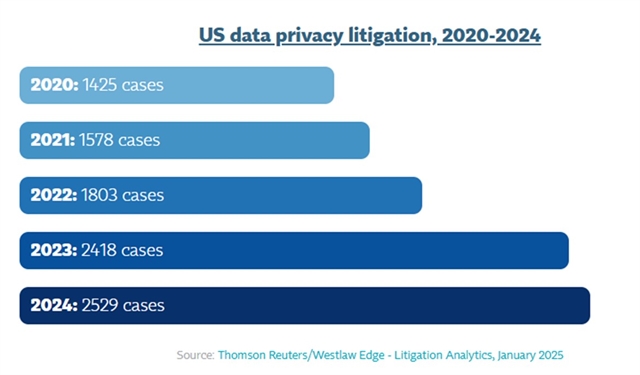Marketers are walking a tightrope between using data smartly and respecting people’s privacy.
While Europe led the way in data privacy legislation with GDPR in 2018, the U.S. is now catching up. California’s CCPA was a turning point in 2020, sparking a wave of similar laws in other states since. This surge in data privacy regulations is transforming the digital marketing landscape and compelling companies and marketers to adapt quickly to meet customers’ growing awareness of data use and demand for more privacy.
Here’s what marketers need to know right now to ensure their organizations are complying with applicable laws and maintaining the privacy of their customers’ data.
The Balance Between Gaining Insights and Respecting Privacy
Marketers need data to create personalized experiences, run effective campaigns, and connect with customers. But they must take a thoughtful approach to data in today’s heightened data privacy environment.
The best way to start is to understand what data you’re already collecting through your website or other digital channels. Marketers should:
- Check traffic sources to see where visitors are coming from.
- Identify tracking scripts and cookies running on their sites.
- Review data collection methods.
And, make sure your website includes a privacy policy that accurately describes how you collect and use data. Learn how to get started here.
Consent Management Platforms: A Marketer's New Best Friend
Beyond taking initial steps to understand what data you’re collecting, you need a full understanding of your data ecosystem. This is where CMPs come in.
Consent Management Platforms (CMPs) are software tools that help websites and businesses collect, manage, and store user consent for processing their personal data, especially for things like cookies and online tracking.
CMPs typically offer features such as:
- Site scanning to automatically detect cookies and tracking scripts
- Consent banners that adapt to a user’s region
- Location-based rules for regional compliance
- Data organization to streamline user preference management
Popular options like Termly, OneTrust, Cookiebot, and Iubenda each offer unique integrations and features. Marketers should take time to select a CMP that best fits their business and technical needs.
If you need help selecting the right one for your organization, we’ve explored nearly every option on the market and can help you make the right choice. Read more about CMPs and contact us to get started.
The Latest on Third-Party Cookie Deprecation
The news of third-party cookie deprecation is wildly exaggerated! Google continues to delay its deprecation plans, which they first announced way back in 2018. But this doesn’t mean that marketers shouldn’t still prepare for a world without third-party cookies.
One excellent strategy is to focus on first-party data collection. First-party data is collected directly from your customers through your own channels (such as your website, app, or email), making it highly accurate and relevant to your business needs. With first-party data, you have full control over how user data is collected, stored, and used, making it easier to comply with privacy regulations and build trust with your customers.
Other strategies like contextual marketing, intent-based marketing, and email marketing can help marketers continue to collect valuable data while honoring privacy.
Third-party cookies aren’t going away anytime soon but utilizing other methods for data collection that honors customer privacy is always a good strategy.
What You Need to Know About Google Consent Mode v2
Google Consent Mode v2 is a tool that helps your website respect your visitors’ privacy choices – especially when it comes to cookies and tracking. It works with your cookie banner or consent platform to make sure Google’s advertising and analytics tools only collect data when users say it’s okay to do so.
The latest version, v2, gives marketers more control over what kinds of data Google can use and lets you fine-tune how your site handles user data based on their choices. This offers several benefits, including:
- Compliance: New privacy laws (like GDPR and the DMA) require you to respect user consent. Consent Mode v2 helps you do that.
- Data Maintenance: Even if some users don’t consent, Google can still provide modeled insights, so you don’t lose sight of your campaign performance.
To get started:
- Use a reputable consent management platform (CMP) that works with Google.
- Make your consent prompts clear and easy to understand.
- Test your setup to make sure everything works as expected.
- Be open with your users about how you use their data.
In short, Google Consent Mode v2 helps you respect privacy laws and user choices while still giving you the insights you need to market effectively. It’s a win-win for you and your audience!
If you need help setting up Google Consent Mode v2, reach out. Learn more about our Data & Analytics services.
Staying on Top of and Compliant with Data Privacy Laws
At the time of this blog post publishing, 20 states have data privacy laws on the books and at least six states have legislation pending.
The iapp reports that privacy actions have become one of the fastest growing litigation types in the United States, with nearly 2,000 data privacy-related federal lawsuits in 2024. Both state and federal lawsuits are trending upward.

So, it’s critical that marketers remain vigilant:
- Run regular site audits to catch new tracking scripts
- Update consent management processes as data collection methods change
- Maintain open communication with legal teams to stay informed about new regulations and best practices for compliance.
- Keep up with new and existing privacy laws. A good CMP can help you enact or enable changes based on evolving legislation.
A proactive approach to data privacy helps businesses avoid compliance risks and reinforces a commitment to user privacy. Marketers and companies that take user privacy seriously will not only meet regulatory demands but also gain a valuable edge in building audience trust and loyalty.
Looking Ahead: Privacy as a Competitive Advantage
Customers are more aware than ever of how their data is used. Companies that make privacy a priority by being transparent, giving users control, and handling data responsibly are seeing higher customer retention and stronger brand loyalty.
Making privacy a core part of your strategy doesn’t just help you avoid legal risks – it helps you gain a real competitive advantage by earning trust, differentiating your brand, and creating lasting value in today’s privacy-conscious marketplace.
By leveraging tools like CMPs, adapting to new data collection methods, and committing to keeping up with ongoing compliance, marketers can successfully navigate our growing privacy-focused world with confidence.
Need help choosing the right CMP or understanding the impact of data privacy laws on your digital marketing efforts? Reach out!







